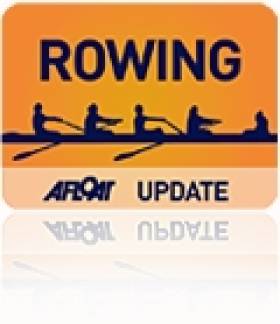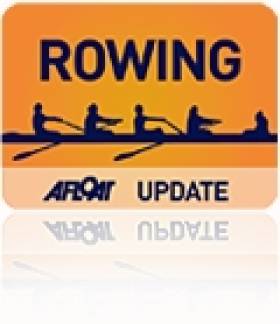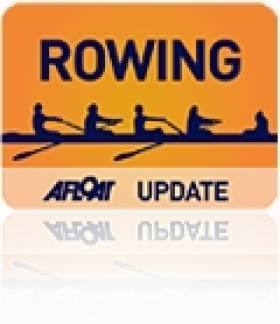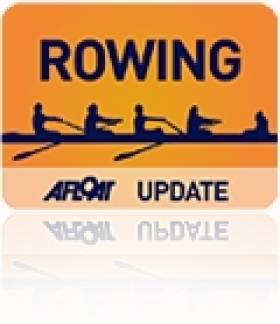Displaying items by tag: cancelled
St Michael's Head of the River Cancelled
#Rowing: The St Michael’s Head of the River, due to be held on Saturday, February 20th, has been cancelled. The club announced that “due to the recent severe weather we have to announce the cancellation of this years’ Head of the River event at O’Briensbridge, County Clare. We hope to stage the event on an alternative date this year. We apologise for this cancellation. However weather conditions has made the staging of the event on February 20th unsafe."
Neptune Head Cancelled
#Rowing: The Neptune Head of the River at Blessington had to be cancelled this morning because of bad weather. The organisers had been ready to go ahead but conditions were not rowable. This is a double blow for the event, as it had originally been fixed for November and had to be called off because of a bad weather forecast.
Ireland Rowing Trial Cancelled
#Rowing: The Ireland trials set for this weekend have been cancelled. Weather conditions at the National Rowing Centre in Cork would not have been suitable. The athletes set to compete will next trial at the Irish Indoor Rowing Championships in Limerick on January 23rd. The weights allowed will 73kg for lightweight men and 59.5 kg for lightweight women, which are those carried forward from the proposed December trial.
Muckross Head of the River Falls to Bad Forecast
#Rowing: The Muckross Head of the River, fixed for the National Rowing Centre in Cork on Saturday, has been cancelled. The organisers say the bad weather forecast, including high winds, would have presented an unacceptable safety risk. The Head of the Shannon, also set for Saturday, has already been cancelled.
Head of the Shannon Cancelled Because of Rising Water Levels
#Rowing: The Head of the Shannon, fixed for Carrick-on-Shannon this Saturday, December 5th, has been cancelled. The organisers say that the rising water levels on the river, combined with the forecast for the weekend, has left them with no alternative. The Muckross Head is also scheduled for Saturday, at the National Rowing Centre in Cork.
Forecast of Strong Gusts Forces Cancellation of Neptune Head
#Rowing: The Neptune Head of the River, scheduled for this Saturday, November 7th, has been cancelled. The weather forecast for the course at Blessington predicted gusts of up to 40 kilometres per hour, forcing the organisers to take the option of calling off the event.
Skibbereen Regatta Cancelled - For Second Time
#ROWING: Skibbereen Regatta, set for Sunday (May 3rd) at the National Rowing Centre, has been cancelled because of an adverse weather forecast – for a second time. The prediction of gusting winds from the south east was bad news for a regatta with a very big entry of small boats. The Grand League event had originally been fixed for April 11th and 12th but also fell victim to the forecast of bad weather. This leaves just two Grand League rounds on the calendar, Dublin Metropolitan and Cork Regatta.
Erne Head Cancelled As Weather Forecast Changes
ROWING: The Erne Head of the River has been cancelled. A radical change in the forecast, with high winds predicted, convinced the organisers that there was a chance that some boats could get into difficulty. The event set for Saturday, was set to be to be the first domestic event of the rowing season – on March 1st. All the other heads of the river have cancelled because of weather-created difficulties.
Rowing Hit Again as Cork Head Falls to Weather
#ROWING: Cork Head of the River, which was scheduled for the Marina in Cork tomorrow (Friday) has been called off. The honorary secretary of the organising committee, Susan Dunlea, informed interested parties today of the decision, stating: "It is with regret that I have to inform you that Cork HOR scheduled to take place tomorrow, Saturday 15th February, has to be cancelled due to the weather forecast. Apologies for any inconvenience caused."
Irish rowing has had no competitive event this year so far. Six heads of the river have been called off: Kerry, Sligo, St Michael's, Shannon, Lagan and now Cork. St Michael's originally rescheduled for next Saturday, February 22nd, but last night abandoned this plan as well.
Head of the Shannon Falls to Floods and Metro Moves to May
#Rowing: The Head of the Shannon, set for this Saturday, has fallen to the bad weather. The event, organised by Carrick-on-Shannon Rowing Club, cannot be held because the river is in flood. The weather forecast is for more high winds.
Irish rowing has had no on-the-water competitive events this year so far, as the St Michael’s, Kerry and Sligo heads have already been cancelled, though St Michael’s say they hope to stage their event on February 22nd.
The Dublin Metropolitan Regatta will now take place on May 17th, moving from its slot in June to fill the space left by the cancelled Queen’s University Regatta.

































































